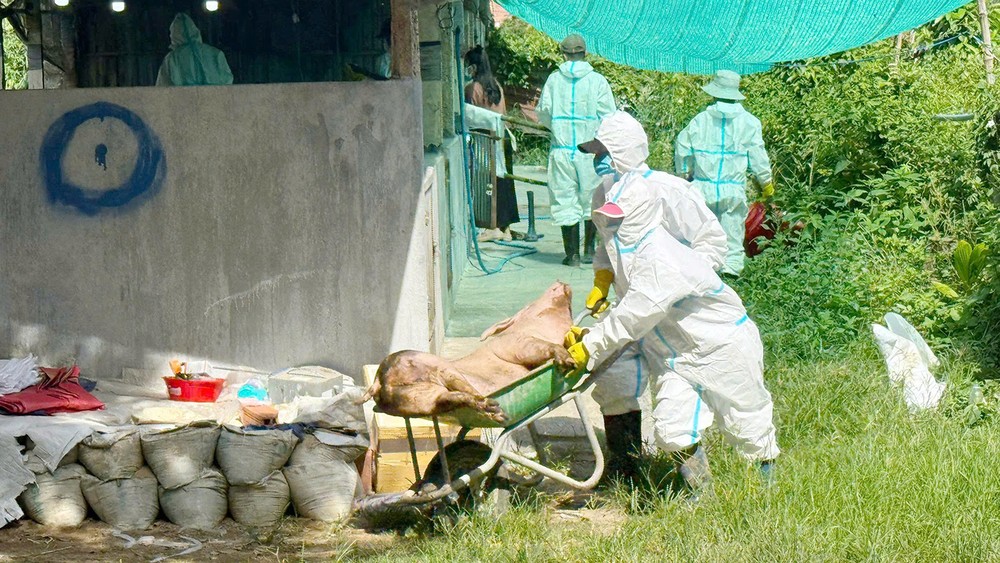Pig farmers in the provinces of Quang Tri, Quang Ngai, and Gia Lai are facing severe hardship as African swine fever continues to spread. Meanwhile, growing concerns over pork consumption are emerging among residents in Hue City.

Despite ongoing containment efforts, African swine fever continues to spread rapidly in Quang Tri Province. Breeder Nguyen Thi Vinh in Huong Phuong Village of Quang Trach Commune had placed her trust in her farm’s stringent disease prevention system. Her operation housed over 200 pigs in an isolated area, with tight controls on vehicle and personnel access, thorough disinfection protocols, and regular lime powder treatment. Yet within just five days, 56 pigs fell ill and died—highlighting the alarming resilience of the outbreak and the limitations of existing biosecurity measures.
According to Deputy Head Duong Viet Phuong Tuan of the Department of Animal Husbandry and Veterinary Medicine of Quang Tri Province, the rapid outbreak of the epidemic is due to extreme weather including prolonged hot weather interspersed with thunderstorms, creating favorable conditions for the virus to survive and spread. Loose oversight of breeding animal sources, inadequate control of transportation methods, low vaccination coverage, and a complacent mindset among some farmers have all contributed to escalating the crisis.
Many households are failing to report initial signs of disease, instead waiting until significant pig mortality occurs before notifying authorities, which complicates control efforts. This situation is particularly acute in Quang Ngai and Gia Lai provinces, where numerous farmers are facing immense pressure as African swine fever continues to spread aggressively.
In Quang Ngai Province, from July 1 to now, African swine fever has broken out in 184 establishments, 78 villages of 15 communes and wards, causing the loss of nearly 1,300 pigs. The Department of Animal Husbandry and Veterinary Medicine of this province mobilized all resources to the epidemic centers to minimize damage to livestock farmers.
Since early 2025, Hue City has recorded 37 cases infecting Streptococcus suis. Among them, 14 patients have recovered, one has died, and three, in serious condition, opted to return home. Director Tran Kiem Hao of the Hue City Department of Health stated that he has instructed relevant units to enhance disease surveillance in the community and strengthen coordination with the agricultural sector and veterinary agencies. He also emphasized the strict implementation of protocols to prevent and control zoonotic diseases.
Meanwhile, concern over pork safety has grown among Hue residents, leading to hesitation in purchasing pork for daily consumption. The sharp decline in consumer demand has prompted many vendors at An Cuu, Ben Ngu, and Dong Ba markets to suspend pork sales, leaving pig farmers struggling to cope with the downturn.
Prime Minister urges response measures against African swine fever
Prime Minister Pham Minh Chinh called for synchronized efforts to prevent and control the spread of African swine fever (ASF) by signing Directive No. 109/CD-TTg.
According to the Ministry of Agriculture and Environment, more than 514 ASF outbreaks have occurred in 28 out of 34 provinces and cities nationwide since the beginning of the year. Over 30,000 pigs have been infected, died, or culled.
A total of 248 outbreaks remain active in 20 provinces and cities within the past 21 days. The risk of ASF resurgence is increasing, especially in areas with large pig populations, negatively impacting the swine industry, food supply, and the environment.
To promptly and effectively control the disease, the Prime Minister has instructed chairpersons of provincial and municipal People's Committees to proactively direct and rigorously implement comprehensive disease prevention and control measures.
Local authorities are to mobilize personnel and legal resources to promptly detect and decisively handle outbreaks, prevent the disease from spreading, and minimize the emergence of new hotspots. Infected or suspected pigs must be culled immediately, and support policies for affected farmers must be implemented in accordance with the present law.
The Prime Minister also stressed the need to strictly prevent and penalize the sale, transport, or disposal of infected pigs, which contributes to disease transmission and environmental pollution. He emphasized that local administrative restructuring must not interfere with efforts to prevent and control the outbreak.
























